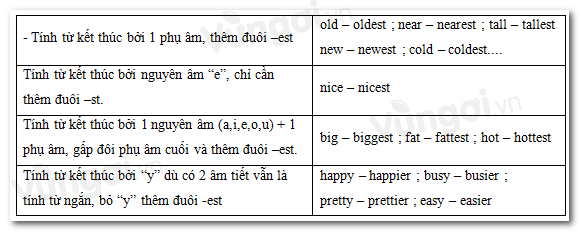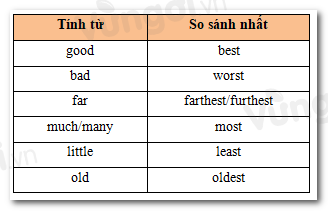Hãy nhập câu hỏi của bạn vào đây, nếu là tài khoản VIP, bạn sẽ được ưu tiên trả lời.

Mình cx ko bt nữa nhưng đề ra như z làm mìn cũng hơi khó hiểu

1. Thì Hiện Tại Đơn (Simple Present):
Công thức thì hiện tại đơn đối với động từ thường
- Khẳng định:S + V_S/ES + O
- Phủ định: S+ DO/DOES + NOT + V(inf) +O
- Nghi vấn: DO/DOES + S + V(inf) + O ?
Công thức thì hiện tại đơn đối với động từ Tobe
- Khẳng định: S+ AM/IS/ARE + O
- Phủ định: S + AM/IS/ARE + NOT + O
- Nghi vấn: AM/IS/ARE + S + O ?
2. Thì hiện tại tiếp diễn (Present Continuous):
Công thức thì hiện tại tiếp diễn:
- Khẳng định: S +am/ is/ are + V_ing + O
- Phủ định: S + am/ is/ are+ not + V_ing + O
- Nghi vấn:Am/is/are+S + V_ing+ O ?
3. Thì quá khứ đơn (Simple Past):
Công thức thì hiện tại đơn đối với động từ thường
- Khẳng định:S + V2/ED + O
- Phủ định: S + did + not+ V(inf) + O
- Nghi vấn: Did + S + V(inf) + O ?
Công thức thì hiện tại đơn đối với động từ Tobe
.
Trong trường hợp dạng bị động của thì quá khứ đơn thì các bạn có thể dùng theo công thức bên dưới:
- Khẳng định: S+ Were/Was + V_ed/V3
- Phủ định: S + Were/Was + V_ed/V3
- Nghi vấn: Were/Was + S + V_ed/V3 ?
4. Tương lai đơn (Simple Future):
Công thức:
- Khẳng định:S + shall/will + V(infinitive) + O
- Phủ định: S + shall/will + not + V(infinitive) + O
- Nghi vấn: Shall/will+S + V(infinitive) + O ?

Tham Khảo
1. is going to take
2. am not going to be
3. isn’t going to take
4. isn’t going to snow
5. Are they going to come tomorrow?
6. When are you going to get back?
7. If you lose your job, what are you going to do?
8. In your opinion, she is going to be a good teacher?
9. What time is the sun going to set today?
10. Is she going to get the job, do you think?
11. Is David going to be at home this evening?
12. What is the weather going to be like tomorrow?
13. There’s someone at the door, are you getting it?
14. How does he get here?
15. Are they going to come tomorrow?
16. He teaches English in a big school in town.
17. When are you going to get back?
18. What are you listening on the radio?
19. Is he playing sports?
20. goes
21. read, listen, watch
22. play
23. likes
24. Is your mother walking to the market now?
25. are running
26. Does Son write to their friends every summer holiday?
27. What are you going to do tonight?

Bạn có thể ôn lại tại trng wed vungoi.vn nha
VD: Lý thuyết so sánh nhất của tính từ:
Ta sử dụng so sánh nhất để so sánh người (hoặc vật) với tất cả người (hoặc vật) trong nhóm. Trong câu so sánh nhất, tính từ sẽ được chia làm hai loại là tính từ dài và tính từ ngắn, trong đó:
- Tính từ ngắn là những tính từ có 1 âm tiết. Ví dụ: tall, high, big,
- Tính từ dài là những tính từ có từ 2 âm tiết trở lên. Ví dụ: expensive, intelligent....
Trong bài học này chỉ đề cập đến dạng so sánh nhất của tính từ ngắn.
1. Cấu trúc câu so sánh nhất đối với tính từ ngắn:

Ví dụ:
- Russia is the biggest country in the world.
(Nga là đất nước lớn nhất trên thế giới)
- My father is the oldest person in my family.
(Bố tôi là người lớn tuổi nhất trong nhà.)
- Quang is the tallest in his class.
(Quang là người cao nhất trong lớp của anh ấy.)
* Lưu ý:
Để nhấn mạnh ý trong câu so sánh nhất, ta thêm “much” hoặc ” by far” vào sau hình thức so sánh.
Ví dụ:
He is the smartest by far.
(Anh ấy thông minh nhất, hơn mọi người nhiều)
2. Cách sử dụng tính từ ngắn trong câu so sánh nhất.
a. Cách thêm đuôi –est vào tính từ ngắn.

Lưu ý:
Một số những tính từ có 2 âm tiết nhưng có tận cùng là “y,le, ow, er” thì áp dụng quy tắc thêm đuôi –est của tính từ ngắn.
Ví dụ: simple – simplest , narrow – narrowest , clever – cleverest
b. Một sốt tính từ bất quy tắc:
Với những tính từ sau, dạng so sánh nhất của chúng sẽ có sự thay đổi.


Câu khẳng định | Câu phủ định | Câu nghi vấn |
S + have/ has + VpII CHÚ Ý: – S = I/ We/ You/ They + have – S = He/ She/ It + has Ví dụ: – It has rained for 2 days. (Trời mưa 2 ngày rồi.) – They have worked for this company for 10 years. (Họ làm việc cho công ty này 10 năm rồi.) | S + haven’t/ hasn’t + VpII CHÚ Ý: – haven’t = have not – hasn’t = has not Ví dụ: – We haven’t met each other for a long time. (Chúng tôi không gặp nhau trong một thời gian dài rồi.) – He hasn’t come back his hometown since 1991. (Anh ấy không quay trở lại quê hương của mình từ năm 1991.) | Have/ Has + S + VpII ? CHÚ Ý: Yes, I/ we/ you/ they + have. -Yes, he/ she/ it + has. Ví dụ: Have you ever travelled to America? (Bạn đã từng du lịch tới Mỹ bao giờ chưa?) Yes, I have./ No, I haven’t. – Has she arrivedLondon yet? (Cô ấy đã tới Luân Đôn chưa?) Yes, she has./ No, she hasn’t. |
5. Dấu hiện nhận biết thì hiện tại hoàn thành
| just, recently, lately: gần đây, vừa mới already: rồi before: trước đây ever: đã từng never: chưa từng, không bao giờ | for + N – quãng thời gian: trong khoảng (for a year, for a long time, …) since + N – mốc/điểm thời gian: từ khi (since 1992, since June, …) yet: chưa (dùng trong câu phủ định và câu hỏi) so far = until now = up to now = up to the present: cho đến bây giờ |
tiếp diễn Tobe+V-ing
Hoàn thành have/has/had+V3
Tương lai Will
Tương lai gần S + is/ am/ are + going to + V.
Quá khứ
1 Thì quá khứ đơn với động từ “TO BE”
2.1.1 Thể khẳng định
Cấu trúc: S + was/ were +…
Trong đó: S (subject): Chủ ngữ
Lưu ý: S = I/ He/ She/ It/ Danh từ số ít + was
S = We/ You/ They/ Danh từ số nhiều + were
Ví dụ: – I was at my uncle’s house yesterday afternoon. (Tôi đã ở nhà bác tôi chi
- They were in Hanoi on their summer vacation last month. (Họ đã ở Hà Nội vào kỳ nghỉ hè tháng trước.)
2.1.2 Thể phủ định
Cấu trúc: S + was/ were + not
Lưu ý: was not = wasn’t
were not = weren’t
Ví dụ: – He wasn’t at home last Monday. (Anh ấy đã không ở nhà thứ Hai trước.)
- We weren’t happy because our team lost. (Chúng tôi không vui vì đội của chúng tôi đã thua.)
2.1.3 Thể nghi vấn
- Câu hỏi Yes/No question
Cấu trúc: Was/ Were + S +…?
Trả lời: Yes, S + was/ were.
/ No, S + wasn’t/ weren’t.
Ví dụ: – Were you sad when you didn’t get good marks?
Yes, I was./ No, I wasn’t.
- Was she drunk last night ? (Họ có nghe khi anh ấy nói không?)
Yes, she was./ No, she wasn’t.
- Câu hỏi WH- question
Cấu trúc: WH-word + was/ were + S (+ not) +…?
Trả lời: S + was/ were (+ not) +….

1.When ..will you get.. (you/get) back?
2.If you lose your job, what ...do you do..(you/do)?
1.When .... (you/get) back?
- When will you get back ?
2.If you lose your job, what .....(you/do)?
- If you lose your job, what will you do ?
1. The teacher is never his temper???